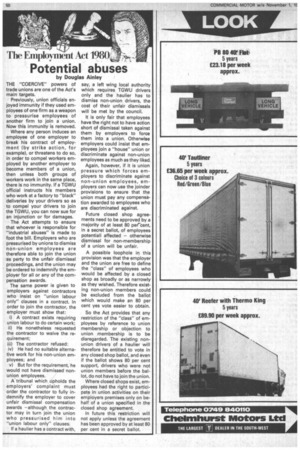The Employment Act 1980
Page 56

If you've noticed an error in this article please click here to report it so we can fix it.
Potential abuses
by Douglas Ainley
THE "COERCIVE" powers of trade unions are one of the Act's main targets.
Previously, union officials enjoyed immunity if they used employees of one firm as a weapon to pressurise employees of another firm to join a union. Now this immunity is removed.
Where any person induces an employee of one employer to break his contract of employment (by strike action, for example), or threatens to do so, in order to compel workers employed by another employer to become members of a union, then unless both groups of workers work in the same place, there is no immunity. If a TGWU official instructs his members who work at a factory to "black" deliveries by your drivers so as to compel your drivers to join the TGW(J, you can now sue for an injunction or for damages.
The Act attempts to ensure that whoever is responsible for "industrial abuses" is made to foot the bill. Employers who are pressurised by unions to dismiss non-union employees are therefore able to join the union as party to the unfair dismissal proceedings, and the union may be ordered to indemnify the employer for all or any of the compensation awards.
The same power is given to employers against contractors who insist on "union labour only" clauses in a contract. In order to join the contractor, the employer must show that: i) A contract exists requiring union labour to do certain work; ii) He nonetheless requested the contractor to waive the requirement; iii) The contractor refused: iv) He had no suitable alternative work for his non-union employees; and v) But for the requirement, he would not have dismissed nonunion employees.
A tribunal which upholds the employers' complaint must order the contractor to fully indemnify the employer to cover unfair dismissal compensation awards —although the contractor may in turn join the union who pressurised him into "union labour only" clauses.
If a haulier has a contract with, say, a left wing local authority which requires TGWU drivers only and the haulier has to dismiss non-union drivers, the cost of their unfair dismissals will be met by the council.
It is only fair that employees have the right not to have action short of dismissal taken against them by employers to force them into a union. Otherwise employers could insist that employees join a "house" union or discriminate against non-union employees as much as they liked.
Again, however, if it is union pressure which forces employers to discriminate against non-union employees, employers can now use the joinder provisions to ensure that the union must pay any compensation awarded to employees who are discriminated against.
Future closed shop agreements need to be approved by a majority of at least 80 per—cent, in a secret ballot, of employees potentiall affected — otherwise dismissal for non-membership of a union will be unfair.
A possible loophole in this provision was that the employer and the union are free to define the "class" of employees who would be affected by a closed shop as broadly or as narrowly as they wished. Therefore existing non-union members could be excluded from the ballot which would make an 80 per cent yes vote easier to obtain.
So the Act provides that any restriction of the "class" of employees by reference to union membership or objection to union membership is to be disregarded. The existing nonunion drivers of a haulier will therefore be entitled to vote in any closed shop ballot, and even if the ballot shows 80 per cent support, drivers who were not union members before the ballot, do not have to join the union.
Where closed shops exist, employees had the right to participate in union activities on their employers premises only on behalf of a union specified in the closed shop agreement.
In future this restriction will not apply unless the agreement has been approved by at least 80 per cent in a secret ballot.




























































































